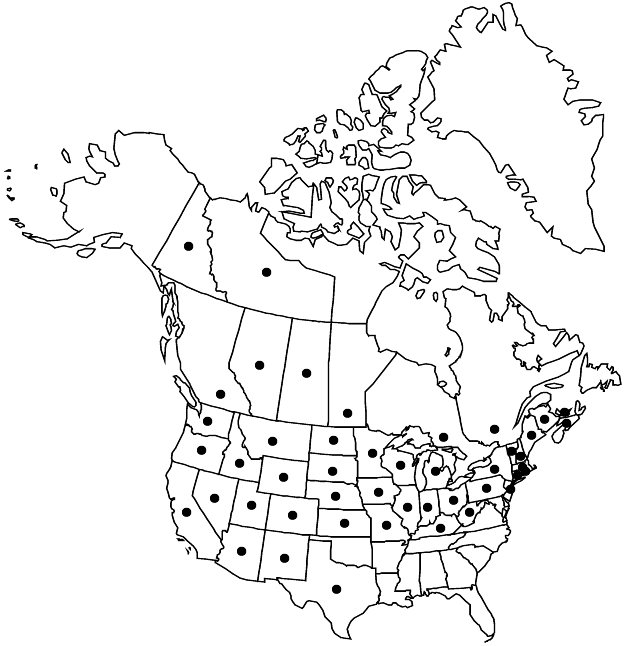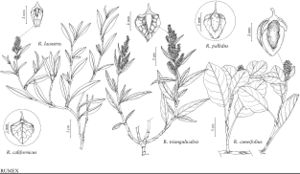Difference between revisions of "Rumex triangulivalvis"
Repert. Spec. Nov. Regni Veg. 40: 297. 1936.
FNA>Volume Importer |
imported>Volume Importer |
||
| (2 intermediate revisions by 2 users not shown) | |||
| Line 8: | Line 8: | ||
}} | }} | ||
|common_names=White;white willow;or triangular-valved dock | |common_names=White;white willow;or triangular-valved dock | ||
| + | |special_status={{Treatment/ID/Special_status | ||
| + | |code=F | ||
| + | |label=Illustrated | ||
| + | }}{{Treatment/ID/Special_status | ||
| + | |code=E | ||
| + | |label=Endemic | ||
| + | }} | ||
|basionyms={{Treatment/ID/Basionym | |basionyms={{Treatment/ID/Basionym | ||
|name=Rumex salicifolius subsp. triangulivalvis | |name=Rumex salicifolius subsp. triangulivalvis | ||
| Line 57: | Line 64: | ||
|publication title=Repert. Spec. Nov. Regni Veg. | |publication title=Repert. Spec. Nov. Regni Veg. | ||
|publication year=1936 | |publication year=1936 | ||
| − | |special status= | + | |special status=Illustrated;Endemic |
| − | |source xml=https:// | + | |source xml=https://bitbucket.org/aafc-mbb/fna-data-curation/src/2e0870ddd59836b60bcf96646a41e87ea5a5943a/coarse_grained_fna_xml/V5/V5_1048.xml |
|subfamily=Polygonaceae subfam. Polygonoideae | |subfamily=Polygonaceae subfam. Polygonoideae | ||
|genus=Rumex | |genus=Rumex | ||
Latest revision as of 22:07, 5 November 2020
Plants perennial, glabrous, with vertical rootstock, occasionally with short-creeping rhizomes. Stems ascending or erect, usually producing axillary shoots below 1st-order inflorescence or at proximal nodes, (30–)40–100 cm. Leaf blades light or yellowish green, veins scarcely prominent abaxially, linear-lanceolate, 6–17 × 1–4(–5) cm, usually ca. 5–6 times as long as wide, widest near middle, thin, not coriaceous, base cuneate, margins entire, flat or undulate, apex acute. Inflorescences terminal and axillary, terminal usually occupying distal 1/5–1/3 of stem, rather dense or interrupted in proximal 1/2, broadly to narrowly paniculate (branches usually with 2d-order branches, rarely simple). Pedicels articulated in proximal 1/3 or almost near base, filiform (but slightly thickened distally), 4–8 mm, usually ca. 1.5 times as long as inner tepals, articulation indistinctly swollen. Flowers 10–25 in whorls; inner tepals broadly triangular, (2–)2.5–3.5(–3.8) × (2–)2.5–3(–3.5) mm, base truncate or rounded, margins entire or indistinctly erose only near base, apex acute, occasionally subobtuse-triangular; tubercles usually 3, (1 in some forms, then large, occupying at least 0.5 width of inner tepal), equal or subequal, much narrower than inner tepals glabrous or minutely verrucose. Achenes brown or dark reddish brown, 1.7–2.2 × 1–1.5 mm. 2n = 20.
Phenology: Flowering late spring–summer.
Habitat: Many types of ruderal and alluvial habitats: waste places, roadsides, railroad embarkments, cultivated fields, meadows, sandy and gravelly shores, ditches
Elevation: 0-2500 m
Distribution

Alta., B.C., Man., N.B., N.S., N.W.T., Ont., P.E.I., Que., Sask., Yukon, Ariz., Calif., Colo., Conn., Idaho, Ill., Ind., Iowa, Kans., Ky., ?La., Maine., Mass., Mich., Minn., Mo., Mont., Nebr., Nev., N.H., N.J., N.Mex., N.Y., N.Dak., Ohio, Oreg., Pa., R.I., S.Dak., Tex., Utah, Vt., Wash., W.Va., Wis., Wyo., Europe, introduced in Czech Republic, Denmark, Finland, Germany, Latvia, Norway, Russia, Switzerland, the Netherlands, Ukraine, United Kingdom, and elsewhere.
Discussion
Rumex triangulivalvis is the most common and widespread species of the R. salicifolius group. It often occurs in ruderal habitats and may be expected outside its present range.
The names Rumex salicifolius and R. mexicanus (in the broad sense) were commonly applied to this species by many North American and European authors.
Selected References
None.
